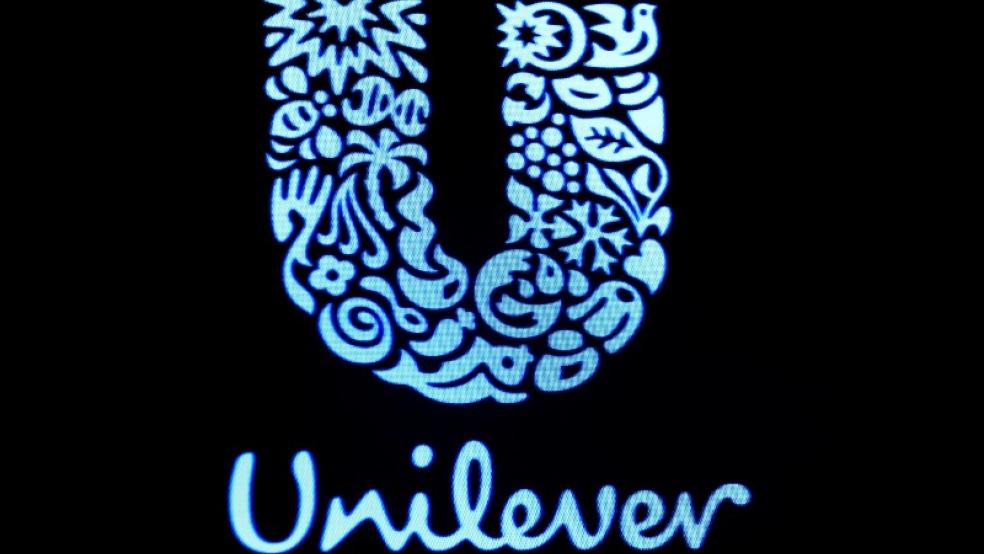LONDON (Reuters) - Unilever reported disappointing third-quarter sales having lost market share to smaller rivals, dampening hopes that a failed takeover bid by Kraft Heinz would spark a swift improvement in performance.Underlying sales rose only 2.6 percent, Unilever said on Thursday. That was below the 3.9 percent growth expected by analysts, and the 3 percent seen in the first half of the year.The company expressed optimism, however, about the auction of its shrinking margarine and spreads business, which officially kicked off last month. First-round bids, expected to reach around $8 billion, are due on Thursday, according to sources familiar with the matter.Unilever's shares fell 5 percent, having risen by a third since Kraft's failed $143 billion takeover bid for the maker of Magnum ice cream and Dove soap in February.The company blamed poor weather in Europe, hurricanes in the United States and earthquakes in Mexico for disrupting sales. But it also cited the growing threat from local competitors in markets such as U.S. ice cream, where it lost market share to Halo Top, a new low-calorie brand capitalizing on growing demand for healthier products and niche names.That change in consumer tastes, along with the embrace of online shopping, subscription services and home delivery plans, is eating away at the traditional dominance of multinationals like Unilever, Nestle and Danone .Swiss rival Nestle reported accelerated third-quarter sales on Thursday, but said increased restructuring costs would weigh on margins."Life is becoming more difficult for the consumer goods giants," said Charlie Higgins, fund manager at Hargreaves Lansdown, which owns Unilever shares. "To succeed in the long term Unilever will need to adapt its business model, becoming more agile and responsive to changing trends."Unilever has made 18 acquisitions since 2015, but is still struggling. "Our competitiveness has dropped off a little," Chief Financial Officer Graeme Pitkethly said. The company is only gaining market share in about half of its business, he said, down from about 60 percent in previous years.The sale of the margarine and spreads business is progressing well, Pitkethly said. He called media reports mentioning potential offers from private equity consortia "interesting".He said the company was also looking forward to possible interest from industry players and those looking for exposure to specific markets. "We've got three or four large groups there," Pitkethly told Reuters about the private equity funds. "But we're also interested to see what comes in from strategics and ... what comes in around our emerging market business. It gets real interesting from now on."Pitkethly said Unilever still plans to spin off the business, which makes Flora and Stork margarines, if it cannot get a good price in a sale. Bankers are working on debt financings of up to 5 billion euros to back the sale, banking sources said.Unilever lifted its profitability target in July as it sought to prove it can deliver better near-term returns as a standalone company. That sparked concern that lower spending on marketing would hurt sales growth in the future. FALLING SHORTPitkethly said the quarter came up about 150 million euros, or about one day's worth of sales, short of internal hopes. "We're not happy with that in aggregate. In fact, we feel we left some runs in the field," Pitkethly said. Hurricanes caused about a week's worth of lost sales in Texas and Florida, its biggest U.S. markets, he said.Unilever's ice cream business, which also includes Ben & Jerry's and Wall's, saw double-digit declines in Europe, hurt by poor weather.Unilever had reduced its advertising and marketing spending by 130 basis points in the first half of the year, in an effort to cut costs in the wake of Kraft's bid. It said on Thursday that its reduced competitiveness was not due to the lower spending or focus on margin growth."The slower pace of growth raises questions as to whether big FMCG players in general are able to compete with smaller, more agile local players who are launching more on-trend products," said Liberum analyst Robert Waldschmidt. Turnover fell by 1.6 percent, hurt by a 5.1 percent hit from foreign exchange rates, the company said.The company stood by its full-year forecast for sales growth of 3 to 5 percent, an improvement in underlying operating margin of at least 100 basis points and strong cash flow. (Reporting by Martinne Geller; editing by Keith Weir and Adrian Croft)

